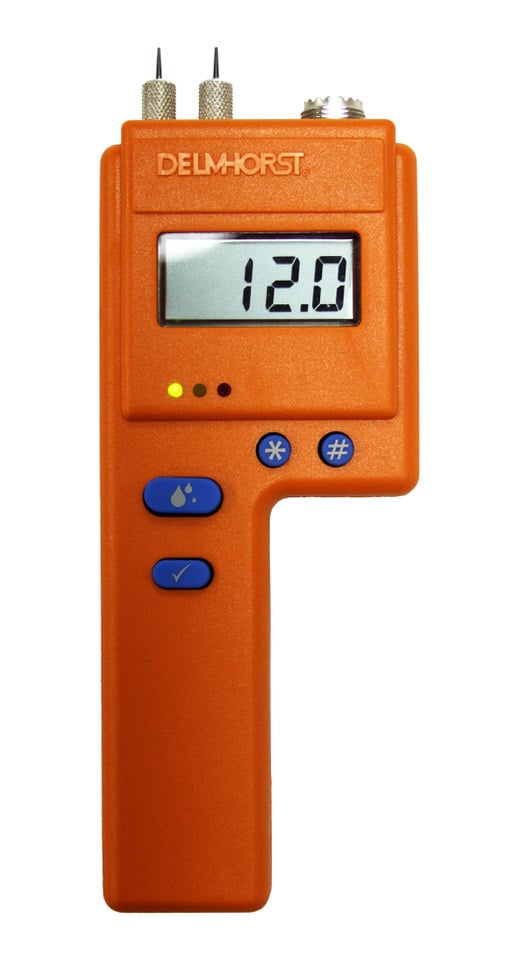Leading 10 Advantages of Using a Moisture Meter for Exact Measurements in your house
Leading 10 Advantages of Using a Moisture Meter for Exact Measurements in your house
Blog Article
The Ultimate Guide to Moisture Meters: A Comprehensive Introduction and Exactly How They Can Save You Cash
Wetness meters offer as important devices in identifying and monitoring moisture material in products, helping in protecting against pricey damages and making sure the top quality of items. Recognizing the nuances of different types of moisture meters, their applications, and the potential cost-saving benefits they supply can be a game-changer for businesses and professionals alike.
Types of Moisture Meters
One usual type is the pin-type dampness meter, which determines the electric resistance between 2 pins inserted right into a material. Pinless moisture meters, on the various other hand, use electro-magnetic sensor plates to scan a bigger area without triggering damages to the product's surface.

Infrared dampness meters determine the thermal residential properties of a material to identify its dampness content non-invasively, making them valuable for applications where pin or pinless meters may not be ideal. Comprehending the various types of wetness meters readily available can aid industries select the most appropriate tool for their certain moisture measurement demands.

Benefits of Using Wetness Meters
Wetness meters use very useful benefits in properly monitoring and assessing dampness degrees in diverse products and atmospheres. One of the primary advantages of making use of wetness meters is the prevention of potential damage caused by excess dampness.
Moreover, using wetness meters can lead to increased energy performance. In farming setups, wetness meters play a critical function in maximizing crop returns by enabling farmers to keep track of soil dampness levels and make notified watering choices.
How to Select the Right Dampness Meter
When selecting a wetness meter, it's essential to make certain that the meter is ideal for the specific material you will be testing. Different materials have differing electrical properties that can impact wetness readings, so picking a meter created for your material is essential for exact outcomes. By carefully evaluating these variables, you can select a moisture meter that fulfills your requirements and offers precise moisture measurements for your projects.
Correct Techniques for Dampness Meter Usage

Expense Cost Savings With Wetness Meter Applications
Exactly how can the calculated use of wetness meters bring about considerable cost savings throughout numerous sectors? Moisture meters play a crucial function in expense financial savings by stopping prospective damages and making sure high quality control in different industries. In the agriculture industry, dampness meters help in figuring out the ideal time for gathering plants, preventing over-drying or excess wetness that can impact the last item's quality. This precise surveillance assists farmers avoid unnecessary losses and maximize their yield.
In a similar way, in construction, dampness meters assist prevent expensive damages by detecting wetness degrees in building products, such as timber or concrete, which can cause architectural problems otherwise addressed immediately. By identifying issue locations at an discover this early stage, contractors can take restorative actions to prevent considerable repairs or replacements, inevitably saving money and time.
Moreover, in the food handling industry, wetness meters are crucial for keeping track of item top quality and ensuring compliance with security laws. By accurately determining dampness content in foodstuff, makers can protect against spoilage, maintain quality, and reduce waste, causing substantial cost savings. Generally, the critical application of moisture meters is a useful investment that can cause significant cost reductions and improved efficiency across various industries.
Final Thought
In final thought, moisture meters are valuable devices for spotting and measuring moisture levels in different products. By using the best moisture meter and following proper strategies, customers can properly protect against pricey problems triggered by excess moisture. Investing in a top quality wetness meter can cause significant price financial savings in the lengthy run by identifying potential concerns early and allowing Moisture Meter prompt removal. Ultimately, moisture meters are crucial tools for maintaining the honesty and long life of products and structures.
Wetness meters offer as crucial tools in identifying and keeping an eye on moisture material in products, aiding in protecting against expensive problems and ensuring the high quality of items. Infrared dampness meters measure the thermal properties of a product to establish its wetness web content non-invasively, making them useful for applications where pin or pinless meters may not be appropriate.Dampness meters provide very useful advantages in precisely keeping an eye on and analyzing dampness levels in diverse products and settings. In farming settings, moisture meters play a vital duty in maximizing crop yields by allowing farmers to keep an eye on dirt dampness degrees and make informed irrigation decisions.In conclusion, moisture meters are important tools for gauging and detecting moisture levels in various materials.
Report this page